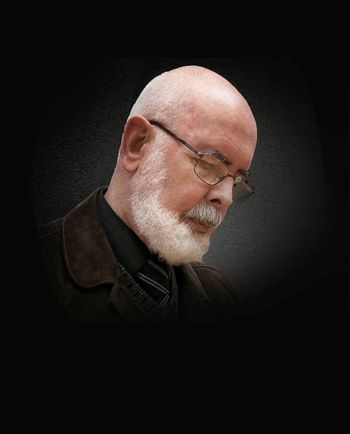
Piotr Lenartowicz – a Polish priest, Jesuit, philosopher, doctor and biologist. He was born on 25 August 1934 in Warsaw. He died on 10 October 2012 in the Krakow Jesuit College. In 1951 he passed his secondary school final exams in Jan Sobieski III Secondary School in Krakow. A year later he started studying at the Faculty of Medicine of the Medical University in Warsaw where, in 1958, he obtained the diploma of medicine physician. From 1956 he worked as an assistant at the Institute of the Man’s Physiology of the Medical University in Warsaw, and from 1958 – also at the Institute of Physiology of the Polish Academy of Sciences in Warsaw.
He defended his doctoral thesis entitled “Wpływ soli amonowych na elektrokortikogram i korowe potencjały bezpośrednio wywołane” [The Influence of Ammonium Salts on Electrocorticography and Directly Induced Cortical Potentials] in 1961 at the Faculty of Medicine of the Medical University in Warsaw. He joined the Jesuit Order on 1 November 1960. Between 1962–1965 he studied philosophy at the Faculty of Philosophy of the Society of Jesus in Krakow where he obtained the canon degree of the Bachelor of Philosophy. Then he studied at the Faculty of Theology of the Collegium Bobolanum in Warsaw (1965-1969) where he also obtained the Bachelor’s degree. He was ordained priest on 17 June 1968 in Warsaw. In 1971 he started his doctoral studies at the Pontifical Gregorian University in Rome. In 1972–1973 he was a chaplain in the Westminster Cathedral in London. At that time he participated in seminars led by prof. Rom Harré at the University of Oxford. He obtained the Ph.D. degree in 1975 at the Pontifical Gregorian University in Rome, based on the doctoral thesis Phenotype-geneotype dichotomy. In 1985 he obtained his postdoctoral degree at the Faculty of Philosophy of the Pontifical Academy of Theology in Krakow, on the basis of the book “Elementy filozofii zjawiska biologicznego” [Elements of the Philosophy of a Biological Phenomenon]. In 1991, the Faculty’s Great Chancellor, the Superior General Peter-Hans Kolvenbach SJ gave Rev. Lenartowicz the title of the associate professor of the Faculty of Philosophy of the Society of Jesus in Krakow. In 1999 he became a full professor. From 1976 he taught introduction to philosophy and the philosophy of animate nature, and from 1990 he also taught the philosophy of cognition at the Faculty of Philosophy of the Society of Jesus in Krakow. From 1995 to 2010 he was the head of the Chair of the Philosophy of Animate Nature at Ignatianum. In 2002-2004 he performed the function of a vice-rector of the Jesuit University Ignatianum in Krakow. Moreover, he gave lectures at the Faculty of Philosophy of the Colorado State University in Fort Collins (USA), at the Theological Seminary of Capuchins in Krakow, and at the Faculty of Philosophy of the Pontifical Academy of Theology in Krakow. Also, he was the president of the Jesuit Priests’ Scientific Society in Krakow (from 1995 to 2001). Between 1982-1990 Rev. Lenartowicz participated in scientific seminars organised by John Paul II in Castel Gandolfo (together with prof. Jerzy A. Janik he was the editor of 4 volumes of materials from those seminars entitled “Nauka – Religia – Dzieje” [Science – Religion – History]). He also took part in the European meetings of Jesuits dealing with the philosophy of nature.
The main area of Rev. Lenartowicz’s interests was the philosophy of animate nature. He believed that one of the basic tasks of a philosopher dealing with biological phenomena is looking for non-arbitrary, objective forms of the whole and analysing the reasons for such forms of the whole. In his research, Rev. Lenartowicz mainly focused on the phenomena of reproduction, growth, regeneration, biochemical changes and adaptation to the environment. He came to the conclusion that the “minimum biological whole” in the context of which biological and philosophical deliberations should be carried out, are individual life cycles connected with each other in lines of generations. Another field of Rev. Lenartowicz’s interests was paleoanthropology. In his texts concerning this subject, he tried to recognise those elements of our ideas on early hominidae that were well documented empirically and to separate them from the elements based on a priori assumptions. For example, he wondered why prehistoric remnants of our ancestors are sometimes grouped into several genera and several dozen species, while the population of the modern man is classified as one genus with only one species – homo sapiens. He did not question the fact of the existence of various morphological forms of hominidae, but he wondered whether the Pliocene and Pleistocene hominidae were truly separate species. According to Rev. Lenartowicz, prehistoric hominidae were probably extinct ecotypes (“paleoraces”) of the same natural species of the man. The experience he gained in his empirical and philosophical work strongly influenced Lenartowicz’s epistemological views. He was a determined supporter of immediatism and an opponent of all forms of representationalism. His characteristic feature was the Aristotle-Thomist “cognitive optimism,” i.e. the belief that we are able to gradually gain reliable knowledge on the reality. Lenartowicz’s most important books include: Phenotype-geneotype dichotomy (1975), “Elementy filozofii zjawiska biologicznego” [Elements of the Philosophy of a Biological Phenomenon] (1986), “Wprowadzenie do zagadnień filozoficznych” [Introduction to Philosophical Issues] (2000), “Ludy czy małpoludy? Problem genealogii człowieka” [Humans or Hominidae? The Problem of Human Genealogy) (2010), “Elementy teorii poznania” [Elements of the Theory of Cognition] (2014; published posthumously).
